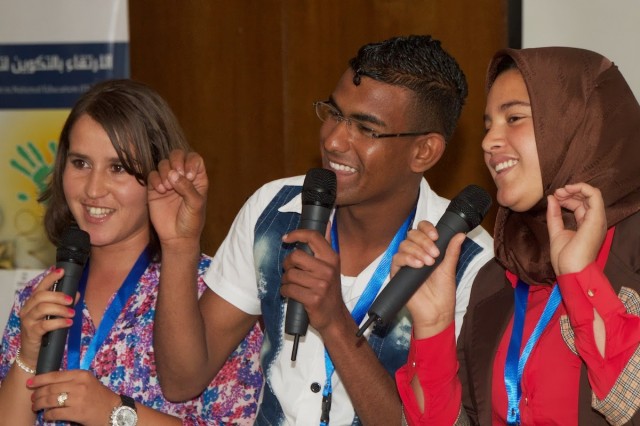
Eric Rusten
Os alunos que abandonam não desaparecem. Eles geralmente ficam subempregados, mais provável de ter uma vida útil mais curta e deixar de se tornar membros ativos de atividades cívicas.
Em Marrocos, os números são impressionantes: 300,000 para 400,000 Crianças abandonam a escola anualmente. A taxa para 7º, 8os alunos ou a 9ª série 2010 alcançado 10.8 por cento, De acordo com o Ministério da Educação. Enquanto os esforços do governo reduzem a taxa de abandono, hoje, um aluno da primeira série tem um 50-50 chance de completar o ensino médio, Relatórios da UNICEF.
Enquanto o governo marroquino, Doadores e outros estão trabalhando para resolver esse problema persistente, Aqueles que são diretamente afetados raramente são consultados sobre os motivos que abandonam a escola ou pedidos para oferecer idéias sobre o que poderia ser feito para reduzir o número de desistências. As poucas vezes em que os jovens são consultados, O processo é controlado por adultos.
Envolvendo alunos do ensino médio
Juventude Speak - O Marrocos aborda essa lacuna, permitindo que os jovens do ensino médio que estão pessoalmente envolvidos no problema de abandono para liderar e conduzir pesquisas com seus colegas e outras partes interessadas para garantir que as perspectivas dos jovens sejam coletadas e claramente apresentadas.
Resumidamente, Os jovens falam é a pesquisa realizada pela juventude, com juventude e para a juventude.
Esta iniciativa de pesquisa de pesquisa e conscientização liderada por jovens habilitada 12 juventude no ensino médio e 12 Jovens que abandonaram o ensino médio para realizar pesquisas rigorosas sobre fatores que contribuem para os jovens que abandonam a escola com outros jovens em idade do ensino médio e membros de comunidades locais.
Juventude fala – Marrocos, que contribuiu para os esforços do governo marroquino para reduzir as queda, foi implementado através A Melhoria do Treinamento da USAID para avanço de qualidade na educação nacional (ITQANE) projeto, administrado por Criativos associados internacionais. O projeto também foi implementado em parceria com a Diretoria de Educação Não Formal do Ministério da Educação.
Os jovens falam - o Marrocos procurou entender melhor os fatores que contribuem para os jovens que abandonam a escola, bem como as ações que as escolas, comunidades, Famílias e o governo podem levar para reduzir as taxas. Ele também aborda os desafios que os jovens enfrentam na transição da escola para o trabalho.
Os jovens falam - o Marrocos aumenta a conscientização sobre a questão abandonada e cria relacionamentos mais eficazes entre as partes interessadas locais para reduzir rapidamente o número de jovens que abandonam a escola.
Pesquisa relevante
O 24 juventude, Organizado em equipes de quatro, conduziu a pesquisa em seis comunidades ao redor do Marrocos. Três métodos de pesquisa - uma pesquisa, Várias discussões em grupos focais e entrevistas detalhadas-eram usadas para coletar informações de alunos do ensino médio, jovens que caíram recentemente, pais e representantes da comunidade.
As equipes de pesquisa, Treinadores adultos Dois jovens falam coordenadores e funcionários criativos e depois analisaram os dados. Cada equipe preparou relatórios de pesquisa locais que foram revisados pelos funcionários do ministério da educação.
As equipes então organizaram eventos locais para apresentar seus resultados à juventude, professores, funcionários e pais de suas escolas e comunidades. Seguindo esses eventos locais, As seis equipes foram reunidas para um evento nacional em Fez.
A pesquisa liderada por jovens produziu as seguintes descobertas:
- Currículos complexos e rígidos não adaptados aos jovens do século XXI levaram a um desempenho ruim
- Longa distância de casa em escola e acesso limitado ao transporte
- Segurança insuficiente no caminho da escola
- Violência e falta de segurança nas proximidades da escola
- 43 Porcentagem de desistentes entrevistados afirmam que deixaram a escola para ganhar a vida para apoiar suas famílias
Apesar desses problemas, Os pesquisados veem o valor da educação.
Clique aqui para obter apresentações de slides de fotos de Dia um para último dia do evento da Juventude Speak!
Eric Rusten é associado sênior, Divisão de Educação para o Desenvolvimento, Criativos associados internacionais.